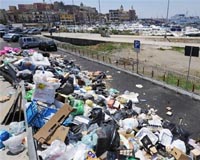| . |  |
. |
Terzigno, Italy (AFP) Oct 26, 2010 Cherry tomatoes, apricots and grapes from the fertile slopes of Mount Vesuvius are at risk from a garbage crisis in the region that could also hit tourist numbers, experts have warned. "The Sari tip is having a detrimental effect on the environment," said Ugo Leone, head of the Vesuvius National Park, some 135 square kilometres (52 square miles) of outstanding natural beauty in the Bay of Naples. Thousands of people have taken to the streets in towns around Mount Vesuvius in recent days to protest against the Sari dump and plans by the government to build a second dump in the area that would be Europe's biggest tip. Both landfills are inside the national park and near the town of Terzigno. In a region plagued by high unemployment and poverty, residents are now afraid of the knock-on effects of the crisis on the local economy. Environmentalists from the Campania region say conditions at the Sari landfill are appalling and illegally dumped substances are leaking toxins into the soil and threatening the quality of locally produced products. Leone, a professor of environmental policy at Naples University, said polluted water supplies under the Sari tip could seep into nearby fields. "We have plum cherry tomatoes, over 50 types of apricots and world-renowned wines like Lacryma Christi ('Tears of Christ')... The volcanic soil is particularly good," Leone told AFP in an interview in the lush, wooded park. "It's obvious that toxins in the water and air where these products are grown will have a negative effect and products will severely suffer," he said. "If plans to open another, much larger landfill go ahead, the impact would be disastrous, particularly in terms of the park's biodiversity," Leone said. The protected area of rare wildlife and plants is also just a few kilometres (miles) from a world-famous tourist destination and UNESCO world heritage site -- the ancient Roman city of Pompeii, destroyed by an eruption of Vesuvius in 79 AD. Visitors to the park and the Roman ruins number around three million a year. "The whole region is suffering economically from a drop in the numbers of tourists visiting the area and a loss in profit from local produce sold," said Pasquale Raia, a spokesperson for the Legambiente environmental group. "There should never have been a landfill in a national park in the first place," he said. "Then in June we discovered there were illegal and dangerous substances being dumped in the tip in complete disregard for a protected area." Residents protesting at the gates of the Sari tip said the crisis was not only putting their health at risk but also taking away their livelihoods. "Tourists love to come and walk in our countryside and visit sites like Pompeii," said Antonella Marra, a 44-year-old protester standing feet away from the garbage that litters the roadsides in the surrounding area. "But when the smell of rotting garbage is everywhere and it's dangerous for people even to breathe in the air, who will come then?"
Share This Article With Planet Earth
Related Links Our Polluted World and Cleaning It Up
 Naples mothers take lead in anti-landfill protests
Naples mothers take lead in anti-landfill protestsTerzigno, Italy (AFP) Oct 25, 2010 Mothers from the Naples region are taking the lead in angry anti-landfill protests, blocking garbage trucks and confronting riot police to warn about the dangers to their children's health. "Living here is impossible," Nazarena Gargiulo, 52, a local teacher who has set up a group called "Volcanic Mothers" in reference to the women's fiery temperament and the nearby Mount Vesuvius volcano, to ... read more |
|
| The content herein, unless otherwise known to be public domain, are Copyright 1995-2010 - SpaceDaily. AFP and UPI Wire Stories are copyright Agence France-Presse and United Press International. ESA Portal Reports are copyright European Space Agency. All NASA sourced material is public domain. Additional copyrights may apply in whole or part to other bona fide parties. Advertising does not imply endorsement,agreement or approval of any opinions, statements or information provided by SpaceDaily on any Web page published or hosted by SpaceDaily. Privacy Statement |